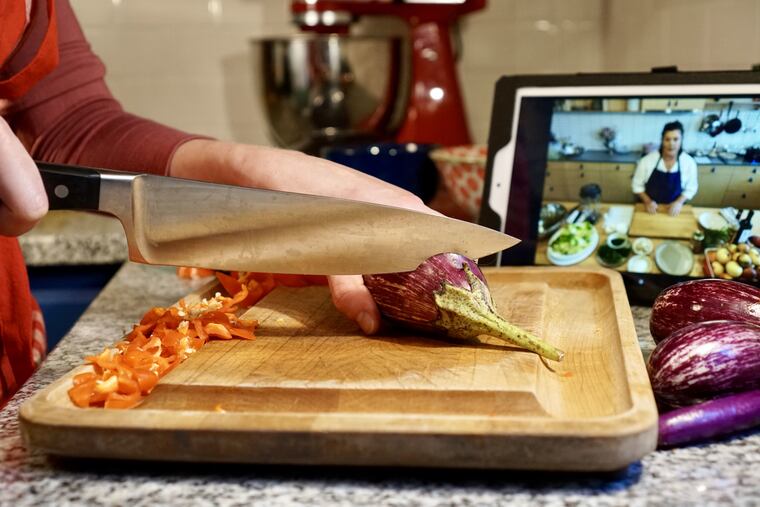Cook alongside Philly’s top chefs in their home kitchens with these virtual classes
Chefstreams is hosting half of cooking classes with Kalaya’s Chutatip “Nok” Suntaranon, Camille Cogswell, among others.

Back in February, Nat Gelb was gathering people around dinner tables at restaurants in a dozen cities per week. His membership-based supper club, the Tasting Collective, was about to launch in its 13th city, topping 6,000 members nationwide. And then came the pandemic.
“It was March 15 — everything came to a screeching halt,” recalls Gelb. “We went from doing seven figures to zero overnight.”
For the foreseeable future, there would be no more family-style dinners with strangers sharing wine. No more chefs relaying stories to cozy rooms full of guests. And no more Tasting Collective, period.
Gelb took a couple weeks to let it all set in. But by April, he was back with a new business idea, Chefstreams. The goal: to help chefs across the country who were hurting with him and continue joining people through food.
Chefstreams invites celebrated chefs like James Beard-award winner Kwame Onwuachi of Washington and Jon Yao, a 2018 Food & Wine magazine Best New Chef, to host interactive cooking experiences virtually from their home kitchens.
Starting Dec. 20, Chefstreams is kicking off a month and a half of cooking classes rooted in Philly. Experiences include those with Kalaya’s Chutatip “Nok” Suntaranon; Food & Wine 2020 Best New Chef Camille Cogswell; Joncarl Lachman of Noord and Winkle; and Ben Puchowitz of Bing Bing Dim Sum and Cheu.
Participants are taught to cook multicourse meals, with dishes from restaurant menus or inspired by signature fare. Classes are paced so guests can cook along in real time. And questions can be asked through Zoom. Classes are biweekly and average about 90 minutes.
“My wife and I have always loved sitting at a bar or chef counter and that exchange you get with owners and chefs,” says Will Hare, 40, who’s done more than a handful of the classes in his Old City home. “This gives that similar intimacy but in a flipped environment where you’re cooking, too.”
The classes appear less like a highly produced Food Network show and more like an upgraded Instagram Live. Chefs are mailed a headset with a high-end microphone, lighting equipment, two tripods (which they get to keep), and two iPhone 12s, which allows for one camera angle focused on the chef and one overhead the stove. It’s thousands of dollars in equipment that makes each experience flow smoothly and yet feel similar to cooking with a friend over Zoom.
The lighting’s slightly better. The audio is clear. Yet it’s intimate. You might see a drip of stress sweat rolling down a chef’s forehead, or a chef forget to salt their ice bath when blanching asparagus. For many of the chefs, this is their first “cooking show,” and they’re learning as they go. Regardless, classes are typically full of personality, pro tips, and personal stories. And Gelb guides the experience, filling any moments of silence with participants’ questions and flipping camera angles when needed.
“It’s a little strange because you’re cooking food for others like at a restaurant, but then the food’s all yours. We made ourselves dinner in front of a live audience,” says Musi chef and owner Ari Miller.
Miller was Chefstreams’ first Philly-based chef. It was also one of Miller’s first livestream cooking experiences, through which he taught guests how to make his signature bowtie pasta with lemon butter sauce. For him, the most exciting part arrived at the end.
“It felt wild to see so many people posting photos tagged ‘Thanks Ari Miller for this dinner,’ ” says Miller. “This virtual community of people all had the same experience that night, in their homes — and all of a sudden, location didn’t matter so much.”
Since his session, Miller has met a few of the participants in person, local guests who sought out his restaurant and introduced themselves when picking up cheesesteaks from his Frizwit menu.
Now nearing 1,000 members, each Chefstreams session averages 100 to 200 participants from all over the country. Chefs are paid based on the number of tickets sold. Tickets are $40 for non-members and $15 for Chefstreams members, who pay an annual $165 fee. From every ticket, $15 goes to the chef, which means if 200 people opt in, chefs can pocket $3,000 from a class.
Each ticket includes access to the live experience, a recipe book, and a recording of the class. All guests are off-camera during the entire session, meaning only you will know how messy your kitchen counters are. You can preview the night’s menu before buying tickets, and once signed up, a grocery list is emailed with the ingredients needed to participate.
“The classes have given us the confidence to be less intimidated and more ambitious,” says Hare, noting two new go-tos — scallion pancakes and tarts. “Now we’re cooking restaurant quality food at home.”
Hare says the pandemic pushed him and his wife to discover more joy in cooking. It’s a trend happening nationwide, and one Gelb doesn’t imagine will end just because a coronavirus vaccine is on the way. Eventually, he’ll pick back up with Tasting Collective’s supper club events, but he plans to keep Chefstreams running well beyond 2021.
“We want to continue to show people how fun cooking can be, and at the end of it, you end up with a delicious meal, too,” says Gelb.
How to sign up: To become a Chefstreams member, visit chefstreams.com and click “request membership invite.” You’ll receive an email inviting you to become a member for $165/year. Classes are announced one at a time and run on a biweekly schedule. Members can view the next class at chefstreams.com/classes. Classes are $15 for members. Non-members must also request a membership invite at chefstreams.com. This signs you up for Chefstreams’ weekly newsletter, through which nonmembers can purchase $40 tickets.